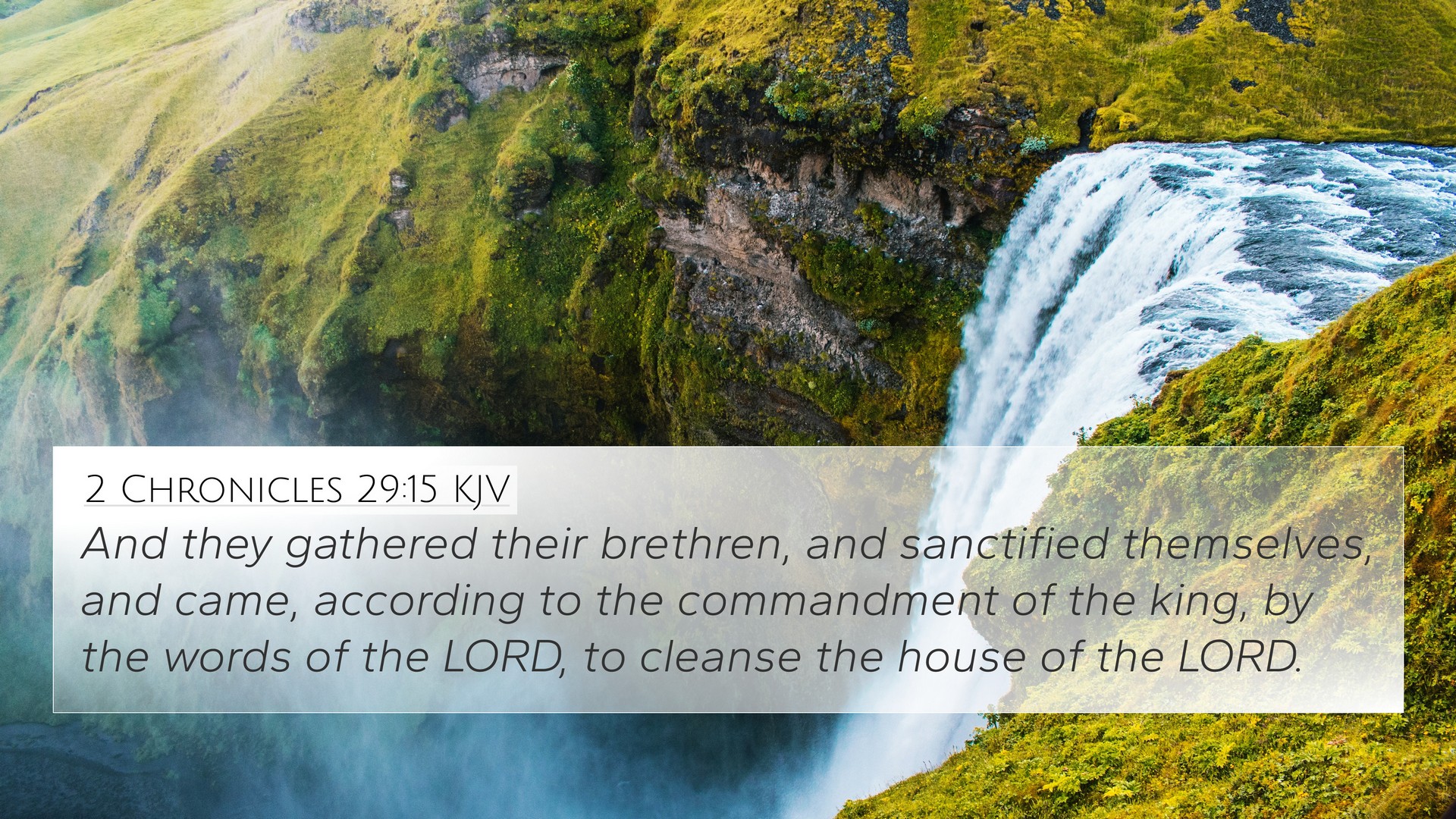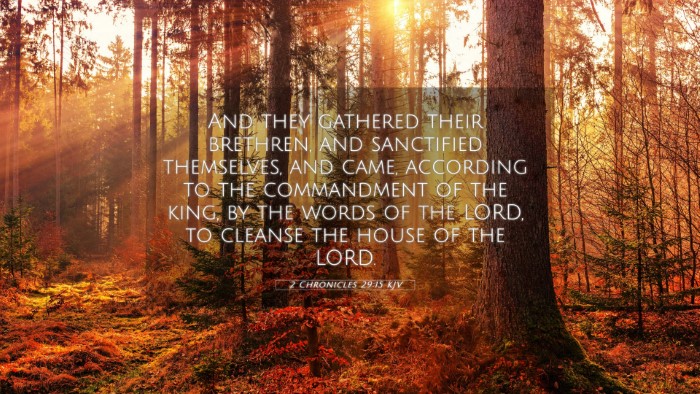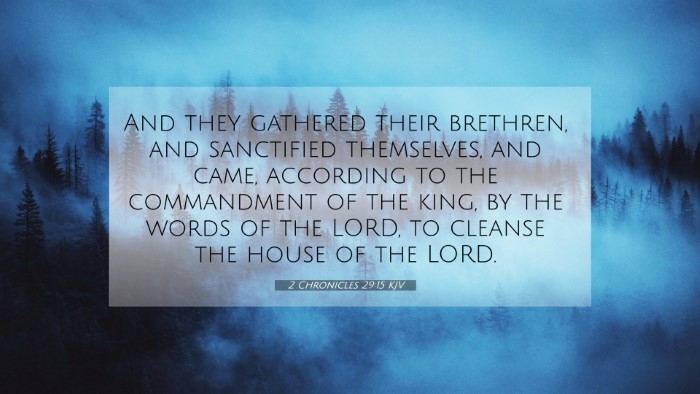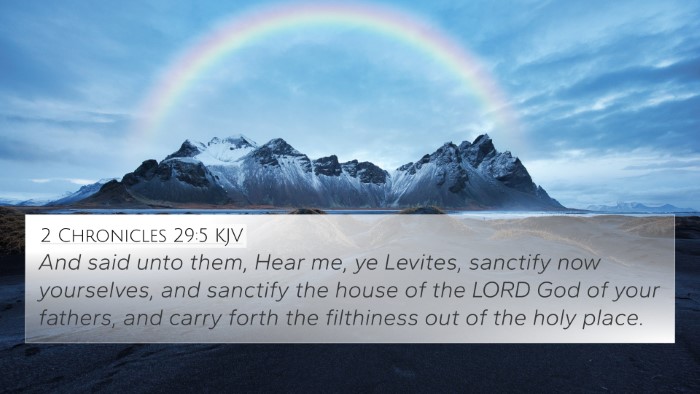Understanding 2 Chronicles 29:15
The verse 2 Chronicles 29:15 states:
"And they gathered their brethren, and sanctified themselves, and came, according to the commandment of the king, by the words of the LORD, to cleanse the house of the LORD."
Overview
This verse highlights a pivotal moment in the reforms instituted by King Hezekiah of Judah. It emphasizes the importance of purification and sanctification before approaching the sacred duties of worship, as part of returning the nation to proper worship of God after years of idol worship and neglect of the Temple.
Key Themes
- Sanctification: Indicates the need to set oneself apart for holy purposes.
- Obedience to God’s Command: Highlights the importance of following the Divine directives (the words of the Lord) in our actions.
- Community Action: Reflects the collective effort of the community in the spiritual renewal process.
- Restoration of Worship: Represents the significant task of restoring proper worship practices in a nation.
Commentary Insights
Matthew Henry's Commentary
Henry notes that the gathering of brethren underlines the unity required in the act of purification and worship. He emphasizes that this was a collective task ordained by the king but rooted in a divine command. The purging of the sanctuary from the impurities of idol worship was essential for re-establishing a covenant relationship with God.
Albert Barnes' Notes
Barnes focuses on the obedience of the priests and Levites who came in response to Hezekiah's command, depicting this as an act of faith and commitment to God. He sees this as a powerful instance of leadership in spiritual matters, where a king can inspire and mobilize a nation towards personal and communal restoration.
Adam Clarke's Commentary
Clarke elaborates on the ceremonial aspects of cleansing the temple, noting that this act is more than mere physical cleaning; it represents a deeper spiritual reformation. He comments on the requirement for the people to 'sanctify themselves', which indicates a personal commitment to holiness as integral to public worship.
Bible Verse Cross-References
The following Bible verses are related to or echo the themes present in 2 Chronicles 29:15:
- Exodus 19:10: Calls for the sanctification of the people before encountering God.
- 2 Chronicles 30:17: Continues the theme of purification and sanctifying the priests for service.
- 2 Chronicles 34:3: Relates to the reforms initiated by King Josiah that echoed the importance of renewal.
- Nehemiah 12:30: Highlights the commitment to purification in the rebuilding of Jerusalem.
- Psalms 51:10: Pursues the theme of creating a clean heart, reflecting personal sanctification.
- 1 Peter 2:9: Speaks of being a chosen generation, called to be holy.
- James 4:8: Encourages believers to draw near to God and cleanse their hands, resonating with the idea of purification.
Comparison to Other Biblical Texts
When conducting a comparative Bible verse analysis, the themes arising from 2 Chronicles 29:15 can be connected to several other scripture passages. For instance:
- Connection to Isaiah 1:16-17: The call for Israel to wash themselves and make themselves clean connects closely with the concept of purification present in Chronicles.
- Linking to Matthew 23:25-26: Jesus rebukes the Pharisees for their outward cleanliness without inner purity, contrasting the sanctification commanded in Chronicles.
- Relating to Romans 12:1: The idea of presenting oneself as a living sacrifice calls for believers to live lives symbolic of the cleansing sought after in the temple.
Conclusion
Understanding 2 Chronicles 29:15 involves recognizing the communal and individual aspects of sanctification in the context of worship. Both historical context and theological implications underscore the importance of returning to God in purity. Study tools such as a Bible concordance and reference materials can be invaluable in exploring deeper connections between this verse and others, enhancing our understanding of scriptural teachings.
Further Study
For those interested in tools for Bible cross-referencing, consider using resources such as:
- Bible cross-reference guides that help identify links across Scriptures.
- Cross-reference Bible study methods to enrich your understanding of the interconnectedness of Scripture.
- Comprehensive Bible cross-reference materials that can deepen your biblical study.





